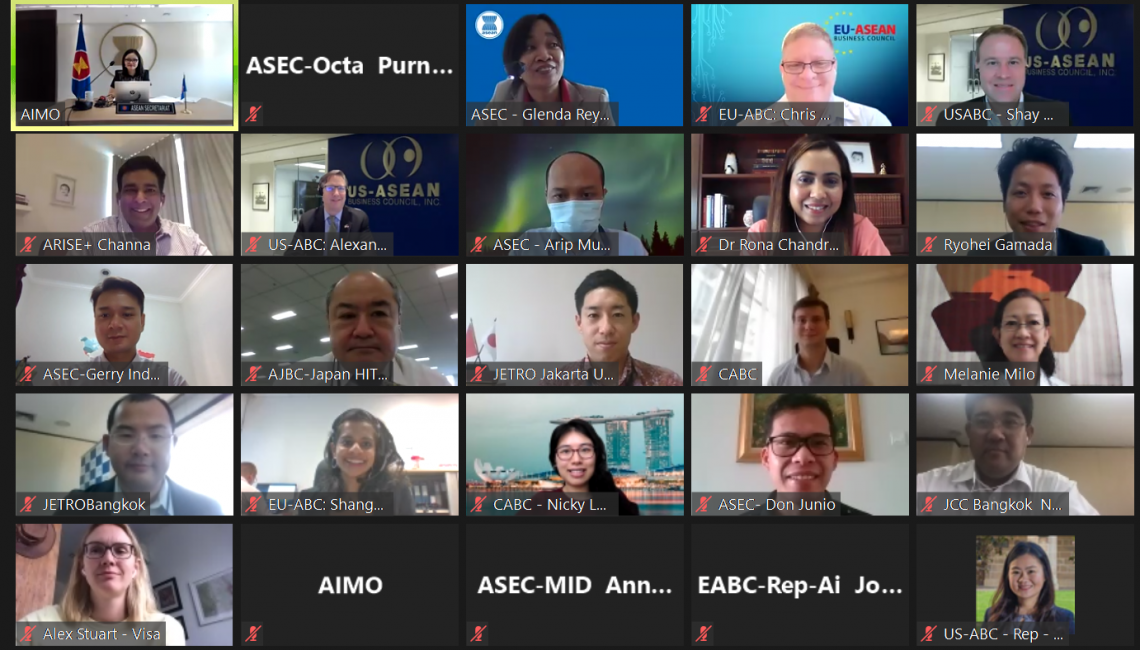JAKARTA, 27 November 2020 – The ASEAN Secretariat organised a virtual Focus Group Discussion (FGD) with the Joint Business Councils on 26 November, as part of the ASEAN Economic Community Blueprint 2025 Mid-Term Review (MTR) exercise.
The FGD aimed at drawing out business insights and perspectives on the outcomes and impact of the AEC and the AEC Blueprint 2025 implementation, and the way forward for the next phase of AEC Blueprint 2025 implementation.
Twenty-five senior executives from eight Joint Business Councils took part in the FGD. Relevant ASEAN Secretariat staff members also attended the discussion.
Within the context of the AEC, participants shared their views on three main themes: (i) enhancing economic integration; (ii) increasing competitiveness and increasing participation in global value chains; (iii) and sustainable and inclusive AEC.
The imperative to accelerate the work on non-tariff measures, streamlining cross-border processes, achieving greater regulatory coherence, fostering inclusive digital transformation, promoting human capital development, and embracing sustainability and inclusivity considerations, were among the key highlights of the discussion.
The results of the discussion will feed into the final report of the MTR on the AEC Blueprint 2025, which is expected to be finalised in early 2021. Meanwhile, a similar event is being organised by the ASEAN Secretariat for ASEAN businesses.
The event took place with support from ARISE Plus Programme.
- ABOUT ASEANThe Association of Southeast Asian Nations, or ASEAN, was established on 8 August 1967 in Bangkok, Thailand, with the signing of the ASEAN Declaration (Bangkok Declaration) by the Founding Fathers of ASEAN: Indonesia, Malaysia, Philippines, Singapore and Thailand. Brunei Darussalam joined ASEAN on 7 January 1984, followed by Viet Nam on 28 July 1995, Lao PDR and Myanmar on 23 July 1997, and Cambodia on 30 April 1999, making up what is today the ten Member States of ASEAN.Menu
- WHAT WE DO
ASEAN organs always strive to achieve ASEAN’s goals and objectives, the Secretary-General of ASEAN and the ASEAN Secretariat shall be functioned as coordinating Secretariat to help facilitate effective decision-making withing and amongst ASEAN bodies. In addition, each Member State shall appoint a Permanent Representative to liaise with Secretary-General of ASEAN and the ASEAN Secretariat
Menu - WHO WE WORK WITH
ASEAN shall develop friendly relations and mutually beneficial dialogues, cooperation and partnerships with countries and sub-regional, regional and international organisations and institutions. This includes external partners, ASEAN entities, human rights bodies, non-ASEAN Member States Ambassadors to ASEAN, ASEAN committees in third countries and international organisations, as well as international / regional organisations.
Menu - OUR COMMUNITIES
The rodmap for an ASEAN Community (2009-2015) was declared by the leaders in 2009. The ASEAN Community, anchored on three community pillars: Political-Security Community, Economic Community, Socio-Cultural Community was launched in 2015. The ASEAN 2025: Forging Ahead Together was introduced in 2015 as a Post-2015 Vision. It comprises the ASEAN Community Vision 2025, the ASEAN Political-Security Community Blueprint 2025, the ASEAN Economic Community Blueprint 2025 and the ASEAN Socio-Cultural Community Blueprint 2025
Menu - SITEMAP





